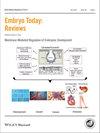Katja M. Bendtsen, Line Fisker, Axel K. Hansen, Camilla H.F. Hansen, Dennis S. Nielsen
下载PDF
{"title":"年轻微生物群对炎症性疾病的影响——来自动物研究的教训","authors":"Katja M. Bendtsen, Line Fisker, Axel K. Hansen, Camilla H.F. Hansen, Dennis S. Nielsen","doi":"10.1002/bdrc.21116","DOIUrl":null,"url":null,"abstract":"<p>Chronic inflammatory diseases are on the rise in the Westernized world. This rise has been correlated to a range of environmental factors, such as birth mode, rural versus urban living conditions, and use of antibiotics. Such environmental factors also influence early life gut microbiota (GM) colonization and maturation—and there is growing evidence that the negative effects of these factors on human health are mediated via GM alterations. Colonization of the gut initiates priming of the immune system from birth, driving tolerance towards non-harmful microorganisms and dietary antigens and proper reactions towards invading pathogens. This early colonization is crucial for the establishment of a healthy GM, and throughout life the balanced interaction of GM and immune system is a key element in maintaining health. An immune system out of balance increases the risk for later life inflammatory diseases. Animal models are indispensable in the studies of GM influence on disease mechanisms and progression, and focus points include studies of GM modification during pregnancy and perinatal life. Here, we present an overview of animal studies which have contributed to our understanding of GM functions in early life and how alterations affect risk and expression of certain inflammatory diseases with juvenile onset, including interventions, such as birth mode, antibiotics, and probiotics. Birth Defects Research (Part C) 105:278–295, 2015. © 2015 Wiley Periodicals, Inc.</p>","PeriodicalId":55352,"journal":{"name":"Birth Defects Research Part C-Embryo Today-Reviews","volume":"105 4","pages":"278-295"},"PeriodicalIF":0.0000,"publicationDate":"2015-12-13","publicationTypes":"Journal Article","fieldsOfStudy":null,"isOpenAccess":false,"openAccessPdf":"https://sci-hub-pdf.com/10.1002/bdrc.21116","citationCount":"29","resultStr":"{\"title\":\"The influence of the young microbiome on inflammatory diseases—Lessons from animal studies\",\"authors\":\"Katja M. Bendtsen, Line Fisker, Axel K. Hansen, Camilla H.F. Hansen, Dennis S. Nielsen\",\"doi\":\"10.1002/bdrc.21116\",\"DOIUrl\":null,\"url\":null,\"abstract\":\"<p>Chronic inflammatory diseases are on the rise in the Westernized world. This rise has been correlated to a range of environmental factors, such as birth mode, rural versus urban living conditions, and use of antibiotics. Such environmental factors also influence early life gut microbiota (GM) colonization and maturation—and there is growing evidence that the negative effects of these factors on human health are mediated via GM alterations. Colonization of the gut initiates priming of the immune system from birth, driving tolerance towards non-harmful microorganisms and dietary antigens and proper reactions towards invading pathogens. This early colonization is crucial for the establishment of a healthy GM, and throughout life the balanced interaction of GM and immune system is a key element in maintaining health. An immune system out of balance increases the risk for later life inflammatory diseases. Animal models are indispensable in the studies of GM influence on disease mechanisms and progression, and focus points include studies of GM modification during pregnancy and perinatal life. Here, we present an overview of animal studies which have contributed to our understanding of GM functions in early life and how alterations affect risk and expression of certain inflammatory diseases with juvenile onset, including interventions, such as birth mode, antibiotics, and probiotics. Birth Defects Research (Part C) 105:278–295, 2015. © 2015 Wiley Periodicals, Inc.</p>\",\"PeriodicalId\":55352,\"journal\":{\"name\":\"Birth Defects Research Part C-Embryo Today-Reviews\",\"volume\":\"105 4\",\"pages\":\"278-295\"},\"PeriodicalIF\":0.0000,\"publicationDate\":\"2015-12-13\",\"publicationTypes\":\"Journal Article\",\"fieldsOfStudy\":null,\"isOpenAccess\":false,\"openAccessPdf\":\"https://sci-hub-pdf.com/10.1002/bdrc.21116\",\"citationCount\":\"29\",\"resultStr\":null,\"platform\":\"Semanticscholar\",\"paperid\":null,\"PeriodicalName\":\"Birth Defects Research Part C-Embryo Today-Reviews\",\"FirstCategoryId\":\"1085\",\"ListUrlMain\":\"https://onlinelibrary.wiley.com/doi/10.1002/bdrc.21116\",\"RegionNum\":0,\"RegionCategory\":null,\"ArticlePicture\":[],\"TitleCN\":null,\"AbstractTextCN\":null,\"PMCID\":null,\"EPubDate\":\"\",\"PubModel\":\"\",\"JCR\":\"Q\",\"JCRName\":\"Medicine\",\"Score\":null,\"Total\":0}","platform":"Semanticscholar","paperid":null,"PeriodicalName":"Birth Defects Research Part C-Embryo Today-Reviews","FirstCategoryId":"1085","ListUrlMain":"https://onlinelibrary.wiley.com/doi/10.1002/bdrc.21116","RegionNum":0,"RegionCategory":null,"ArticlePicture":[],"TitleCN":null,"AbstractTextCN":null,"PMCID":null,"EPubDate":"","PubModel":"","JCR":"Q","JCRName":"Medicine","Score":null,"Total":0}
引用次数: 29
引用
批量引用

 求助内容:
求助内容: 应助结果提醒方式:
应助结果提醒方式:


